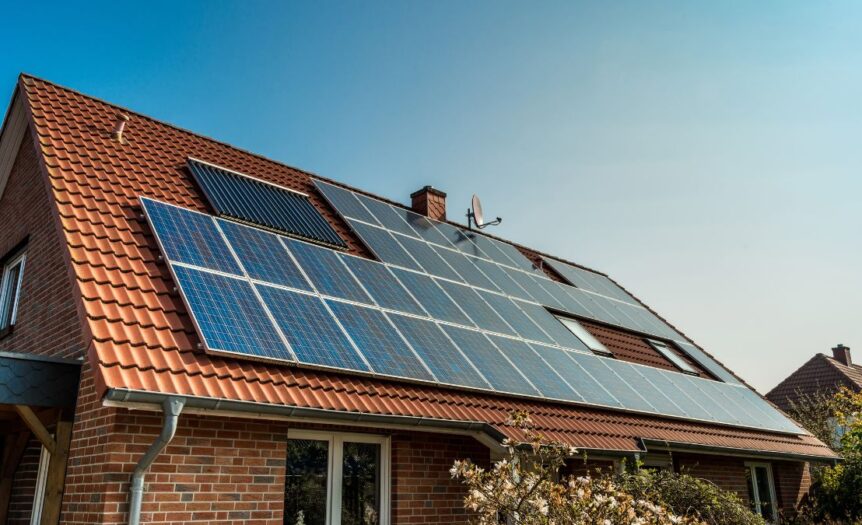Solar power is taking the world by storm. Solar panels dot every suburban residence, and businesses use solar power farms and floatation devices to power their operations. People are even using solar chargers to charge their phones! Despite all these things, misconceptions surround the purpose and capabilities of solar power. We’ll debunk some common misconceptions about solar panels to help you come to the correct conclusion about this technology.
Solar Power Only Works on Sunny Days
Many people believe that solar panels are perfect for sunny days but useless when clouds roll in. Solar technology is useful in many weather conditions, including snowy and rainy days. They don’t operate at full capacity during these times—you’ll likely get about 70 percent of the output you would normally get on sunny days.
Solar panels perform best in sunny and cold climates. This is because heat can interfere with sunlight conversion into electricity. The only time solar panels don’t draw power is at night. One of the benefits of solar battery storage for your home is that you can take advantage of solar energy during nighttime. Then, you’ll have power all day and night!
Solar Panels Aren’t Efficient Enough
You might hear that solar panels have an efficiency rate below 25 percent. Some sunlight will turn into heat instead of electricity, or sunlight might reflect off the panel. Solar cell materials can’t absorb every form of light on the spectrum, such as infrared. Inefficiency is a common misconception about solar panels. Solar energy is actually improving each year with further research, so solar panels are far more efficient than you think.
Solar Panel Installation Is Too Expensive
Residential costs for solar panel installation can be anywhere from $16,000-$35,000. That said, you don’t have to pay for everything in a lump sum before installation. Many solar financing options are available, and you can pay in small chunks over time. Many city and state tax rebates and incentives can offset costs, making solar power more than worth its upfront cost.





 Deering Estate
Deering Estate
 Massage Envy South Miami
Massage Envy South Miami
 Calla Blow Dry
Calla Blow Dry
 My Derma Clinic
My Derma Clinic
 Sushi Maki
Sushi Maki
 Sports Grill
Sports Grill
 The Healthy Kitchen
The Healthy Kitchen
 Golden Rule Seafood
Golden Rule Seafood
 Malanga Cuban Café
Malanga Cuban Café

 Kathleen Ballard
Kathleen Ballard
 Panter, Panter & Sampedro
Panter, Panter & Sampedro
 Vintage Liquors
Vintage Liquors
 The Dog from Ipanema
The Dog from Ipanema
 Rubinstein Family Chiropractic
Rubinstein Family Chiropractic
 Your Pet’s Best
Your Pet’s Best
 Indigo Republic
Indigo Republic




 ATR Luxury Homes
ATR Luxury Homes


 2112 Design Studio
2112 Design Studio
 Hamilton Fox & Company
Hamilton Fox & Company
 Creative Design Services
Creative Design Services
 Best Pest Professionals
Best Pest Professionals
 HD Tree Services
HD Tree Services
 Trinity Air Conditioning Company
Trinity Air Conditioning Company
 Cisca Construction & Development
Cisca Construction & Development
 Mosquito Joe
Mosquito Joe
 Cutler Bay Solar Solutions
Cutler Bay Solar Solutions


 Miami Royal Ballet & Dance
Miami Royal Ballet & Dance
 Christopher Columbus
Christopher Columbus
 Pineview Preschools
Pineview Preschools
 Westminster
Westminster
 Carrollton
Carrollton
 Lil’ Jungle
Lil’ Jungle
 Frost Science Museum
Frost Science Museum
 Palmer Trinity School
Palmer Trinity School
 South Florida Music
South Florida Music
 Pinecrest Orthodontics
Pinecrest Orthodontics
 Dr. Bob Pediatric Dentist
Dr. Bob Pediatric Dentist
 d.pediatrics
d.pediatrics
 South Miami Women’s Health
South Miami Women’s Health

 The Spot Barbershop
The Spot Barbershop
 My Derma Clinic
My Derma Clinic




 Miami Dance Project
Miami Dance Project

 Rubinstein Family Chiropractic
Rubinstein Family Chiropractic
 Indigo Republic
Indigo Republic

 Safes Universe
Safes Universe
 Vintage Liquors
Vintage Liquors
 Evenings Delight
Evenings Delight





 Atchana’s Homegrown Thai
Atchana’s Homegrown Thai
 Baptist Health South Florida
Baptist Health South Florida

 Laser Eye Center of Miami
Laser Eye Center of Miami
 Visiting Angels
Visiting Angels
 OpusCare of South Florida
OpusCare of South Florida

 Your Pet’s Best
Your Pet’s Best





 HD Tree Services
HD Tree Services
 Hamilton Fox & Company
Hamilton Fox & Company


 Creative Design Services
Creative Design Services